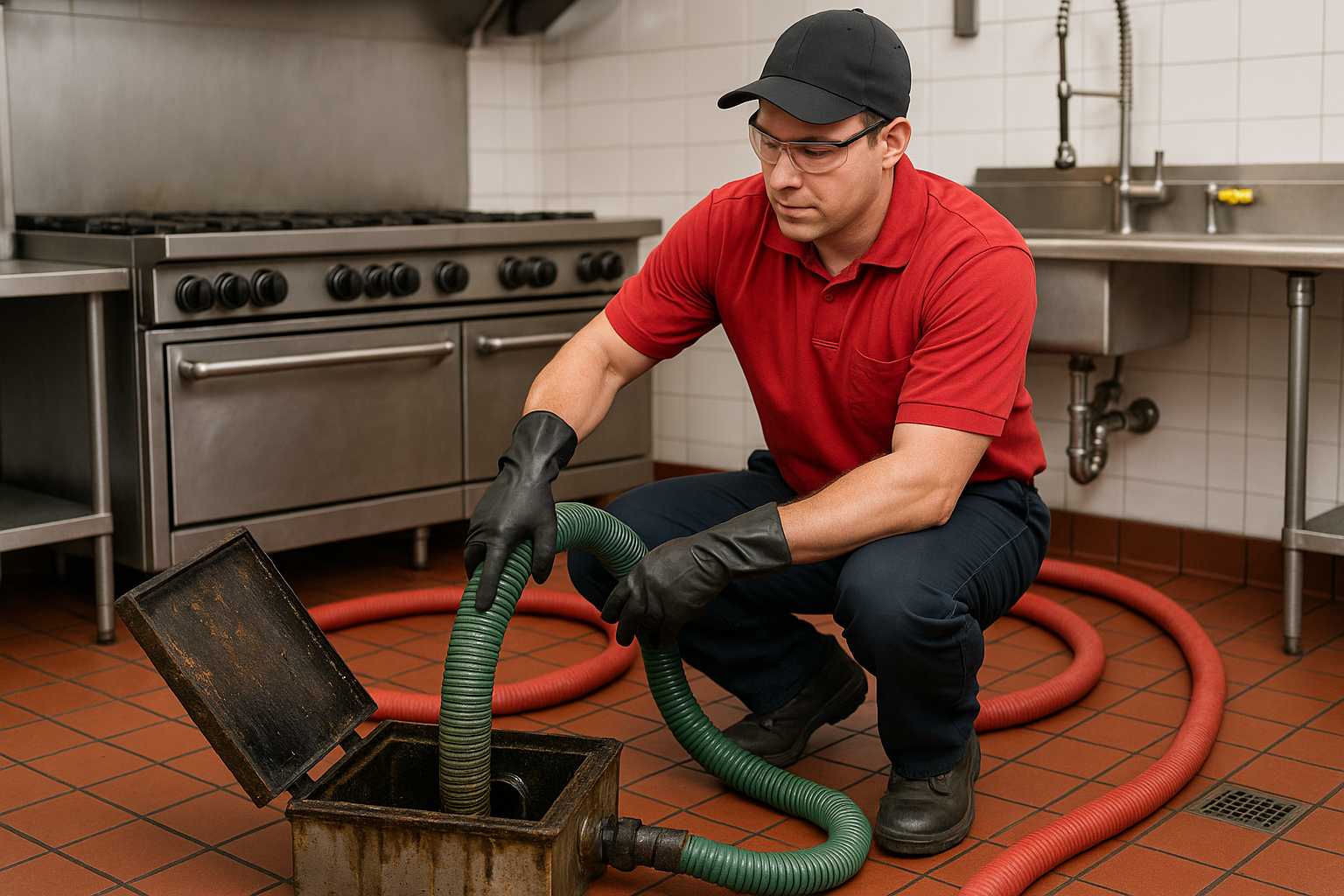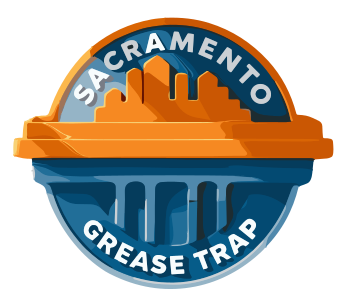Find Reliable Grease Trap Cleaning Near You

The Hidden Struggles Behind Grease Trap Issues in Sacramento
Grease trap problems always seem to appear at the worst possible time: slow drains, foul odors, or surprise inspections that catch you off guard. If you’ve ever scrambled to search for grease trap cleaning near me in a moment of panic, you’re not alone. Many Sacramento restaurant owners and commercial kitchen operators face these same challenges daily.
The issue is simple: grease traps fill up fast. When they do, they can shut down your kitchen, trigger violations, or create messy and expensive backups. But the bigger challenge is finding a reliable provider who understands local FOG regulations and the fast-paced demands of commercial kitchens.
This guide will walk you through everything you need to know about choosing the right provider, what to expect during grease trap cleaning services, how often to schedule cleanings, and real-world examples from Sacramento businesses. By the end, you’ll know how to stay compliant, avoid plumbing disasters, and keep your kitchen running efficiently.
Let’s get started.
Why Reliable Grease Trap Cleaning Matters for Sacramento Businesses
A dependable grease trap service is essential for any Sacramento kitchen trying to stay safe, compliant, and operational. Local FOG regulations require routine grease trap maintenance to protect wastewater systems, and failing to follow these rules can result in costly fines or temporary shutdowns.
Reliable service provides key benefits, including:
• Reduced risk of clogs and backups
• Improved sanitation and odor control
• Compliance with Sacramento County FOG regulations
• Extended equipment lifespan through proper care
Many business owners underestimate how quickly grease accumulates, which creates a false sense of security. This often leads to emergency grease trap pumping situations that could have been avoided with a regular cleaning schedule.
How to Choose the Best Grease Trap Cleaning Near You in Sacramento
Understanding Local Regulations and Required Maintenance
Local wastewater regulations define how often a trap must be cleaned, what documentation is required, and how FOG waste must be managed. A reputable provider helps you understand your responsibilities and ensures you stay compliant.
They should evaluate your kitchen’s volume, trap size, and historical FOG levels to determine the right cleaning frequency. Providers who offer proper documentation and guidance are essential for long-term compliance. You can also review maintenance expectations and compliance tips through the FOG Best Practices resource.
Evaluating Service Quality and Customer Support
Choosing the right provider goes beyond basic pumping. The best companies offer:
• Clear communication
• Detailed digital service logs
• Transparent cost estimates
• Round-the-clock emergency availability
• Certified and trained technicians
Reliable grease trap cleaning services help prevent unnecessary downtime by keeping your kitchen on a predictable maintenance schedule.
Comparing Response Times and Emergency Availability
When searching for grease trap cleaning near me, fast response time is critical. A clogged trap can halt your operations instantly. Your provider should offer same-day or emergency services when needed.
Quick response reduces environmental hazards, prevents kitchen shutdowns, and ensures compliance is maintained.
Reviewing Equipment, Technology, and Environmental Practices
Modern commercial grease trap cleaning requires specialized tools and sustainable handling methods. Quality providers typically use:
• High-capacity vacuum trucks
• Eco-friendly cleaning agents
• Compliant waste disposal processes
• Line inspection technology
Companies that follow environmentally responsible practices often align with guidelines from agencies such as EPA and maintain compliance with regional wastewater regulations.
Checking Local Reviews and Sacramento-Specific Experience
Local experience matters. Providers who work regularly with restaurants, schools, hotels, and food trucks in Sacramento understand unique kitchen setups, city requirements, and common pitfalls. Reviews from local operators can help verify reliability and professionalism.
To better evaluate Sacramento providers, explore detailed comparisons and recommendations through the best grease trap cleaning service guide.
Practical Use Cases for Grease Trap Cleaning in Sacramento
Different kitchens have different needs, and understanding these variations helps determine your ideal service frequency.
Midtown Restaurants
High-volume kitchens often need monthly appointments due to heavy fryers and dishwashing activity. Routine cleaning reduces backup incidents by up to 40%.
Small East Sacramento Cafés
Lower-volume businesses may schedule quarterly service, but still need consistent documentation to stay compliant.
Food Trucks and Mobile Vendors
These setups use smaller traps that fill quickly due to limited tank capacity. Regular service prevents breakdowns during busy events.
By tailoring service to your kitchen type, you reduce the risk of emergencies and maintain efficient operations.
Best Practices and Common Mistakes to Avoid
• Schedule Routine Cleanings Consistently
Most Sacramento kitchens benefit from monthly or quarterly cleaning. A consistent schedule helps reduce long-term repair costs and prevents FOG overload. For guidance, refer to the grease trap cleaning schedule.
• Avoid Pouring Oils Down Drains
Train staff to dispose of oil properly, which reduces the strain on your trap and extends time between services.
• Monitor FOG Levels Weekly
A quick visual check identifies early warning signs and prevents emergencies. If levels approach 25 percent, schedule service immediately.
• Document Every Cleaning
Keep service reports and technician notes organized. Documentation is essential for inspections and compliance.
• Choose Licensed and Certified Providers
Qualified professionals ensure safe pumping, compliant disposal, and environmentally responsible handling. You can review proper disposal methods through the waste disposal resource.
Final Thoughts
Grease trap cleaning is essential for keeping your Sacramento kitchen running efficiently, legally, and safely. With the right partner, you avoid plumbing emergencies, reduce operational interruptions, and maintain compliance with local requirements.
Now that you understand what to look for, you’re ready to choose a reliable provider who delivers consistent, high-quality service. For full-service support—cleaning, pumping, documentation, and environmental compliance—you can explore the Sacramento Grease Trap Cleaning service or schedule routine pumping through the grease trap pumping service.
For broader industry insights on maintenance and long-term kitchen efficiency, resources like Forbes occasionally provide helpful overviews on restaurant operations and infrastructure.
FAQs About Grease Trap Cleaning Near You
1. How often should I schedule grease trap cleaning in Sacramento?
Most businesses require service every 1–3 months. High-volume restaurants usually need monthly visits, while smaller kitchens can extend their intervals.
2. What are the signs my grease trap needs immediate service?
Slow drains, foul odors, grease buildup, or backups indicate you need urgent service. Schedule emergency cleaning if any of these occur.
3. Are grease trap cleaning services required by law in Sacramento?
Yes. Sacramento County enforces strict FOG regulations, requiring regular cleaning and documentation.
4. Can I clean my grease trap myself?
Small under-sink traps can be cleaned in-house, but larger interceptors require professional equipment and expertise.
5. How long does a grease trap cleaning appointment take?
Typically 30–90 minutes, depending on trap size and FOG levels. Larger systems may require more time for pumping and inspection.

Let Us Simplify Your Grease Trap Maintenance.
Proper grease trap maintenance will reduce costly repairs in the future.
.avif)

